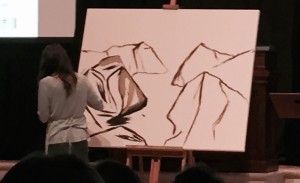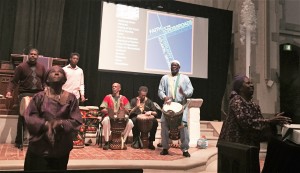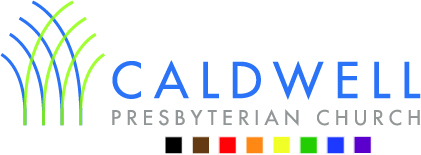
Dear Caldwell,
Anne Hunter Eidson and I fell into a great bargain opportunity to attend the NEXT Church Conference in Atlanta this week. We both come home with notebooks full of notes, ideas, contacts and opportunities to share. I thought I might share a few here to give you a taste of our experience and invite your thoughts. (See below for chances to discuss.)
NEXT is a relatively new organization (about 10 years old) of Presbyterians that is independent of our official denominational structure (though there is heavy overlap). NEXT was created as a gathering and idea-sharing group of younger, forward-leaning, more progressive Presbyterian leaders. This is the third NEXT Conference I’ve attended (second for Anne) and the worship, workshops and speakers do a lot to nurture and feed our effort to be your pastors.

The Conference theme was “Faith at the Crossroads,” which came out in many aspects of the gathering. Interestingly, much of this year’s conference focused on the related topics of race, diversity, reconciliation, conflict and peacemaking. These are, like it or not, relevant subjects for the life of many churches in our increasingly pluralistic times. Many congregations are divided over the question of same-gender marriage and ordination (both have been approved in our denomination, but each church can decide its own stance on marriage). Against that backdrop, as we all see too painfully, there is also plenty of strife and disagreement in America over other issues, including race and class, especially in the current political climate. So, we can see why NEXT thought this general subject area was a timely focus.
At risk of being a bit lengthy, I thought I would share some of the highlights and invite your thoughts, discussion and questions. Also, Anne and I would like to share more with anyone who is interested. You can exchance thoughts and questions on the new Caldwell Conversations Facebook page. Also, we will host an informal gathering in the Shelby Room Monday night at 6:30 p.m. to share more from the conference and, perhaps, watch bits of videos of it online on the NEXT website.

Non-Violent Communications: An expert from Western Theological Seminary led several sessions on this emerging topic. Essentially, it equips those who are in dialogue with people who are different and/or have different views. In any human relationships, disagreement, even conflict, comes up. Non-violent communications equips us to avoid the “totalizing” effect of reducing “the other” to the image of an enemy. Instead, it encourages us to see the good in the other person, to listen for their need and to remember that divisiveness, whether racism, homophobia or something else, is more systemic than relational, IF we can remember that “the other” is made in the image of God as each of us is. Thus, while we should “tear down” racist systems we should not “tear down” individuals.
Toxic Charity: Many may know about this idea from a notable book a few years ago by Bob Lupton. It challenges us to know the difference between charity that, however well intended, does harm – versus the kind of support that empowers those in need and honors their dignity. “The role of leaders,” Lupton says (I might say ALL disciples), “is to marshal all resources responsibly.” A Caldwell group studied these ideas a few years ago and I am sure we can gather another group to read his book if any are interested. His four guiding rules, which some may disagree with, are:
- Never do for another person what they can do for themselves.
- Limit one-way giving to crises. Otherwise, seek ways of legitimate, honest exchange. Even the poor have the capacity to return the help in some way.
- Empower those in need by hiring, lending, investing in them. Offer gifts sparingly as a way to reinforce achievement.
- Put the interests of the poor above one’s own (and one’s organization’s) needs and agenda.
- Listen carefully for unspoken needs, knowing that clues to the needs of neighbors are often not immediately visible.
- Above all, do no harm.
Allan Boesak: This veteran of the anti-apartheid movement in South Africa, who also is not without controversy, included these points in his speech, entitled “Let Us Not Be Afraid,” (a quote from Pope Francis)
- Invoking the Belhar Confession (which we are using in worship in Lent), he said, “The church, as a possession of God, must stand where God stands. God stands in a special way with the poor and the marginalized.”
- Reconciliation, which must be “real, radical and revolutionary,” is “a calling that lies at the very heart of discipleship, requiring daily commitment and conversion.”
- “If Christ gave his life as God’s son to be reconciled with the world, why do we think less is required?”
- Turning the lens on himself and the movement, he acknowledged that the anti-apartheid movement at times forgot that reconciliation was, first and always, a gospel issue. As a result, he said, the movement made it a national issue that sometimes lost sight of the gospel.

Preacher Rev. Aisha Brooks-Lytle (Wayne Presbyterian, PA), preaching on the story of Jesus and the woman at the well:
- “In America today, it is as if we are celebrating racism’s Golden 50th Anniversary.”
- “We as the church cannot keep silent. We come from a long line of voices that have spoken up.”
Jessica Vazquez Torres, a Latina anti-racism and anti-oppression trainer and leader, offered four rules of anti-racism work:
- Racism can’t be understood apart from white supremacy
- History matters and must be uncovered in depth.
- Racism is structural, not relational
- All of us are made complicit in racism. We all have illicit biases and must own our complicity.
Agreeing and Disagreeing in Love, Andrew Plocher, pastor of Grace Lutheran Church, Gwinn, MI, and veteran trainer in working with church conflict:
- Conflict always consists of three parts – people, a problem and process.
- Living through conflict is like living through Holy Week – a time of death, uncertainty, resurrection and new life.
Understanding White Fragility, J.C. Austin, Vice President of Christian Leadership Formation at Auburn Seminary in NYC. Is your understanding of race rooted in what is called “white fragility?” Maybe so if:
- You think race is a problem of (a few) bad people rather than an issue of systemic causes and potential solutions
- You think racism is just a matter of having good intentions, even when we make mistakes … rather than a requirement to take a hard look at the true, generational impact of racism in our country.
- Even a small amount of racial stress becomes intolerable for you.
How does the Reformed tradition help us understand and think about racism?
- Through the Doctrine of Original Sin, we understand that we are all sinful and in need of redemption in Christ.
- Through the Doctrine of Total Depravity, we know that no part of our humanity is NOT touched by sin. Thus, as sinful beings, humans cannot construct unblemished systems and institutions. Thus, we all stand in need of God’s grace and the Holy Spirit.
Whew! If you’ve read this far, you have an idea of how tired Anne’s and my brain were after 2.5 full days and nights. If any of this interests you, come on out Sunday night and we can talk more or jump on the Caldwell Conversations Facebook page. No expertise promised or guaranteed – just constructive, healthy dialogue on important matters of the Gospel.
In Christ,
John
